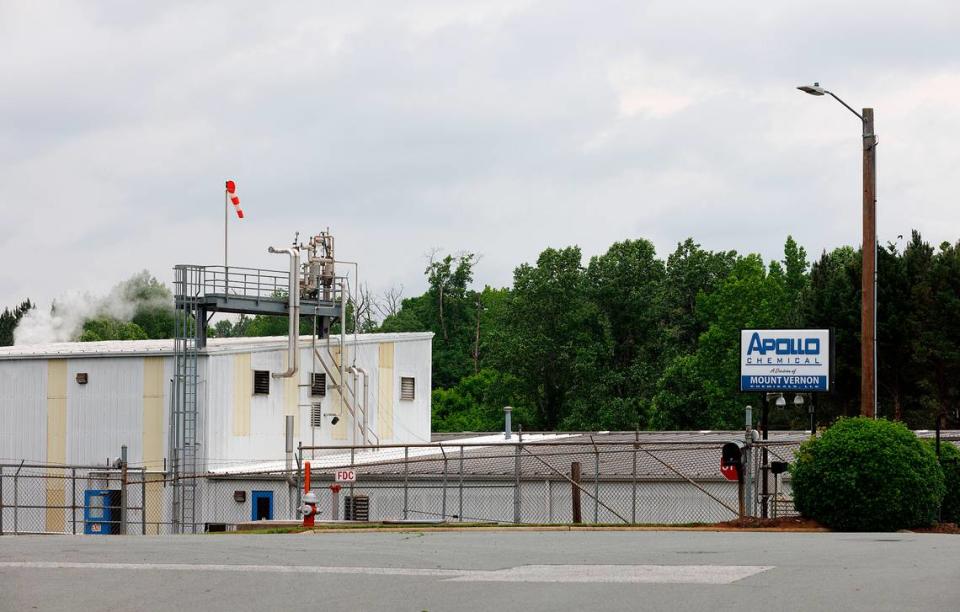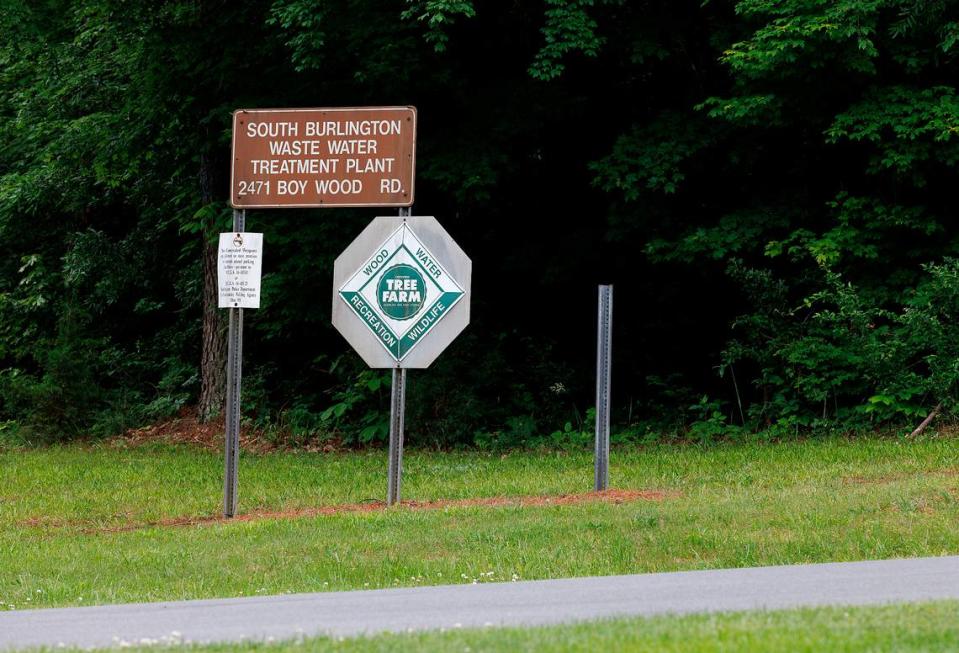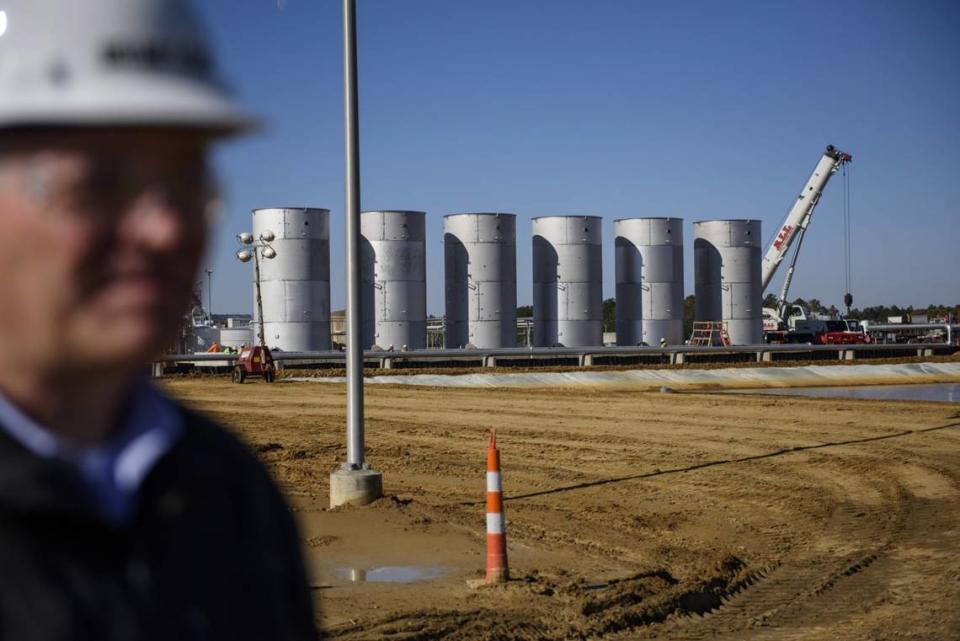A key environmental board controlled by Republican appointees is stalling efforts to regulate chemicals that have contaminated North Carolina drinking water supplies, including forever chemicals and an industrial solvent that is a likely human carcinogen.
North Carolina does not have enforceable standards for the chemicals despite scientific evidence showing the risks they pose to human health.
N.C. Department of Environmental Quality staff have asked the Environmental Management Commission to start rulemaking for groundwater and surface water standards for eight per- and polyfluoroalkyl subsances. They have also asked the EMC to start early on a triennial review of the state’s surface water standards that include 1,4-dioxane limits.
But those requests have stalled in the commission’s water quality and groundwater committees, frustrating environmental advocates and, increasingly, DEQ leadership.
Republicans took over EMC
The Environmental Management Commission was one of the boards whose makeup was overhauled by legislation last year, after Republicans won a supermajority in both houses, allowing them to pass legislation without worrying about a veto from Democratic Gov. Roy Cooper.
The new rules allowed Republican legislative leaders and Agricultural Commissioner Steve Troxler, also a Republican, to appoint the commission’s majority.
Previously, Cooper appointed nine of the EMC’s 15 members. Senate Bill 512 shifted two of those appointments to Troxler. GOP leadership also amended an elections bill last fall to immediately replace two Cooper appointees with Troxler’s picks.
At the first meeting after the changes, Republican appointees voted to replace Robin Smith, an environmental lawyer and former state assistant environmental secretary, as chair. J.D. Solomon, an appointee of House Speaker Tim Moore and former EMC chair, became the new leader.
Solomon was traveling for business and said in an email he was unavailable to comment.

1,4-dioxane risks
North Carolina’s drinking water has the third-highest concentration of 1,4-dioxane in the nation, with the Cape Fear River basin particularly impacted. Many 1,4-dioxane discharges are linked to utilities, which accept wastewater from industrial customers and cannot remove the solvent before discharging it into tributaries of the Deep and Haw rivers.
In Pittsboro, there have been three occasions since July 2023 where a “slug” of 1,4-dioxane emanated from a chemical company in Burlington, passed through a wastewater treatment plant and headed downstream to Pittsboro’s Haw River intake.
In January, Pittsboro had to stop drawing water from the Haw for days because of a 1,4-dioxane slug that is believed to have been released by a chemical factory in Burlington. Prior to the release, 1,4-dioxane was measured at 2.4 parts per billion in the Haw, below the Environmental Protection Agency’s health advisory goal of 35 ppb. After the release, The N&O reported, a 1,4-dioxane measurement found 545 ppb.


North Carolinians receive just one-fifth of the protections from 1,4-dioxane that a water quality standard would offer, according to a human health risk assessment DEQ submitted to the General Assembly last week. Instead of a water quality standard, North Carolina has “in-stream target values” for 1,4-dioxane, which are unenforceable recommendations.
The state’s Rules Review Commission stymied a previous effort to regulate 1,4-dioxane in May 2022, finding that DEQ had improperly analyzed costs associated with the rule.
Last November, the EMC sued the Rules Review Commission over that decision.
In January, during Solomon’s first meeting as chair, the EMC voted to dismiss the lawsuit. The eight Republican appointees voted for dismissal, while the seven Cooper appointees voted to move forward.
Moments after the vote, Solomon pledged to regulate 1,4-dioxane.
“We are not going to drop this issue,” Solomon said. “It is of public health consequence.”
Smith, the former EMC chair, said she would vote against the motion because the lawsuit was the state’s best chance to quickly implement 1,4-dioxane regulations.
“It will take three years to get through the rulemaking process and may lead us right back to where we are now,” Smith said.


EMC committees meet Wednesday
On Wednesday, the EMC’s Water Quality Committee will hear informational presentations about the PFAS surface water standards and triennial review dealing with 1,4-dioxane. The Groundwater and Waste Management Committee will hear about proposed PFAS groundwater standards.
No votes are scheduled.
DEQ Secretary Elizabeth Biser sent a letter so EMC members last week saying she was “deeply disappointed” the groundwater committee asked to hear a presentation on PFAS, its fourth since November. The committee has received enough information to vote, Biser wrote.
A vote would send the rule to the full EMC in June, beginning public comment and hearing processes
“Absent further and immediate action by the Commission, residents and local utilities will continue to shoulder the burden of treatment cost while groundwater cleanup is delayed,” Biser wrote.
DEQ is proposing these limits on PFAS, 1,4-dioxane in drinking water supplies
PFAS limits and the NC Chamber
PFAS are commonly referred to as forever chemicals because of their persistence in the environment. Different PFAS have been linked to a wide array of health impacts from delaying development to links with some cancers. The EPA recently finalized drinking water standards for six of the compounds.
The North Carolina Chamber, which describes itself as “the state’s largest, broad-based business advocacy organization,” has lobbied for delaying PFAS regulation.
Gary Salamido, the Chamber’s president and CEO, wrote an April 22 letter to Biser and EMC members saying limits on PFAS should be delayed until research shows how DEQ’s proposed rules intersect with the EPA’s new drinking water limits and the costs of complying with the rules can be better understood.
“It is important that we do not hastily pass regulations without fully accounting for both the positive benefits and potential negative impacts proposed rules would have on the state and its business community,” Salamido wrote.
The proposed groundwater and surface water standards are necessary, Biser responded, to help water utilities meet their new drinking water obligations while lessening the costs they will incur building treatment technology and swapping out PFAS-saturated carbon. A fiscal note evaluating costs and benefits is part of any rulemaking process, she added.
“The key question at hand is whether everyday North Carolinians should bear the entire burden of cleaning up PFAS contamination (while also dealing with health impacts) or whether businesses releasing PFAS into the environment should also bear responsibility,” Biser wrote.
When the N&O reached out to Salamido for comment, Kate Payne, a Chamber spokeswoman, responded with a prepared statement.
“The NC Chamber has a transparent and open process to engage government when advocating for certainty and predictability for North Carolina’s business community, particularly on the regulatory front,” Payne’s statement read, in part.
Chemours, which for decades contaminated the Cape Fear River with undisclosed forever chemicals and has spent nearly half a billion dollars complying with a state consent order, is one of the corporate members of the NC Chamber and holds a position on the advocacy group’s Manufacturing Council.


NC Reality Check is an N&O series holding those in power accountable and shining a light on public issues that affect the Triangle or North Carolina. Have a suggestion for a future story? Email realitycheck@newsobserver.com
This story was produced with financial support from the Hartfield Foundation and Green South Foundation, in partnership with Journalism Funding Partners, as part of an independent journalism fellowship program. The N&O maintains full editorial control of the work. If you would like to help support local journalism, please consider signing up for a digital subscription, which you can do here.
